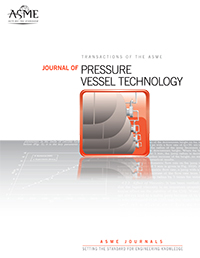Fracture toughness testing was conducted on compact tension specimens cut from the Fast Flux Test Facility primary piping materials of 16-8-2 and 308 stainless steel welds aged at 427 and 482°C for 20,000 and 50,000 hr. The ductile fracture behavior of the materials was characterized at 205, 427, and 482°C using multiple and electric-potential single-specimen techniques. Electric-potential data were used to caculate crack extensions via an electric-potential calibration equation for the construction of J-R curves. Results demonstrate that the critical fracture-toughness values are in good agreement with those from the multiple-specimen method. Results showed that 20,000-hr aging caused more than 35 percent degradation in fracture resistance, and 50,000-hr aging resulted in a slight increase in Jc for 16-8-2 stainless steel welds. It was found that the fracture toughness levels of the primary piping after long-term aging were high and adequate at the aging temperatures and that fuel handling temperature, nonductile fracture was not expected to occur in these materials.
Skip Nav Destination
Article navigation
Research Papers
Fracture Toughness of Aged Stainless Steel Primary Piping Welds Evaluated by Multiple and Single-Specimen Methods
F. H. Huang
F. H. Huang
Materials and Welding Engineering, Westinghouse Hanford Company, Richland, WA 99352
Search for other works by this author on:
F. H. Huang
Materials and Welding Engineering, Westinghouse Hanford Company, Richland, WA 99352
J. Pressure Vessel Technol. May 1993, 115(2): 201-206 (6 pages)
Published Online: May 1, 1993
Article history
Received:
February 18, 1991
Revised:
November 24, 1992
Online:
June 17, 2008
Citation
Huang, F. H. (May 1, 1993). "Fracture Toughness of Aged Stainless Steel Primary Piping Welds Evaluated by Multiple and Single-Specimen Methods." ASME. J. Pressure Vessel Technol. May 1993; 115(2): 201–206. https://doi.org/10.1115/1.2929516
Download citation file:
Get Email Alerts
Cited By
Experimental and Numerical Study on the Protection Efficiency of a Diamond-Shaped Thermal Jacket for Gun Barrels
J. Pressure Vessel Technol (June 2024)
A New Design Method for Obround Shells
J. Pressure Vessel Technol (June 2024)
A Finite Element Analysis-Unascertained Measure Theory-Based Hybrid Approach to Safety Assessment for Pipelines Subject to Landslide Disasters
J. Pressure Vessel Technol (June 2024)
Study on Dynamic Post-Buckling Stability of Thin-Walled Cylinders Subjected to Horizontal Vibration
J. Pressure Vessel Technol (June 2024)
Related Articles
Fracture Toughness of Aged Stainless Steel Primary Piping and Reactor Vessel Materials
J. Pressure Vessel Technol (November,1987)
Prediction of Ductile-to-Brittle Transition Under Different Strain Rates in Undermatched Welded Joints
J. Pressure Vessel Technol (June,2011)
Multispecimen Fatigue Crack Propagation Testing
J. Eng. Mater. Technol (July,1981)
The Effect of Prestrain on Ductile Fracture Toughness of Reeled Pipeline Steels
J. Pressure Vessel Technol (June,2011)
Related Proceedings Papers
Related Chapters
Applications of Elastic-Plastic Fracture Mechanics in Section XI, ASME Code Evaluations
Online Companion Guide to the ASME Boiler & Pressure Vessel Codes
Subsection NE — Class MC Components
Companion Guide to the ASME Boiler and Pressure Vessel Code, Volume 1, Third Edition
Subsection NE—Class MC Components
Companion Guide to the ASME Boiler & Pressure Vessel Code, Volume 1, Second Edition












